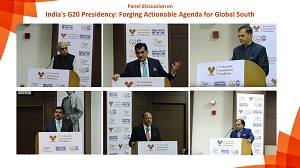The Vivekananda International Foundation (VIF) in collaboration with the India Writes Network/Centre for Global India Insights organized a Vimarsh panel discussion on “India’s G20 Presidency: Forging Actionable Agenda for Global South” on 24 February 2023. The panel discussion was aimed at identifying and exploring concrete South-centric initiatives which India can introduce and advance in the G20 agenda.
The event hosted a distinguished panel of speakers. The Keynote Address was delivered by Shri. Amitabh Kant, the G20 Sherpa. Among the panellists for the events were Shri. V Srinivas, IAS, Secretary DARPG, Government of India, Ambassador Muktesh Pardeshi, Special Secretary, India's G20 Secretariat and Ambassador Sujan Chinoy, Chair of the Think20 forum and Director General MP-IDSA. The event was chaired by Dr. Arvind Gupta, Director VIF. Shri. Manish Chand of the India Writes Network proposed the vote of thanks. A special issue of the magazine India and the World titled “India’s G20 Moment: Healing Hope & Harmony” was also released on the occasion.
The panel discussion brought forth several aspects of the G20 presidency of India and how it was geared towards addressing the concerns of the Global South. It was pointed out that India’s presidency is taking place in the context of post-COVID poverty, debt crisis and a geopolitical crisis. India, in these circumstances, seeks convert these challenges to opportunities to reduce poverty, achieve the sustainable development goals and address the climate crisis. India could be seen as an exemplar by the countries of the South as it has digital public infrastructure that has enabled digital transformation to benefit the poorest of poor. This and other narratives of India on health, housing and potable water can be extended to many parts of the Global South.
The discussion also veered on the manner in which India was implementing its G20 presidency to make it a people’s G20. At the core of it, working groups and ministerial meetings are being conducted and are being complemented by meetings of engagement groups, side events, forums and seminars. One unique effort among these was the Voice of the Global South Summit, which was attended by nearly 120 countries of the Global South. This was the first ever attempt to include a large number of countries that are not part of the G20 to deliberate on issues that affect them and they would like the G20 to take up.
It was also pointed out that the G20 has adopted some initiatives to support the countries of the Global South. Such initiatives include the Base Erosion and Profit Sharing (BEPS) agreement that was concluded during the Rome Summit and the Debt Service Suspension Initiative that was adopted during the presidency of Saudi Arabia. These however are too few and far between. There is case to be made for adopting other initiatives that affect large populations in a more fundamental way. Such initiatives could focus on the sustainable development goals, Start-ups, reform of the World Bank and the IMF, as well as that of the WHO.
Finally, it was suggested that to protect the interests of the Global South, there has to be simultaneous emphasis on some issues. First, there needs to be a conscious effort at promoting Lifestyle for Environment and preserving biodiversity. Second, there needs to equitable financing for creating a green world. Third, there must be a focus on growth helmed by more quotas for countries at the IMF and additional funding from the World Bank. Lastly, the Sustainable Development Goals must be adhered to with utmost attention to food security.
While the focus of discussion was the Global South in G20, it was sufficiently emphasised that this would not imply adversarial relations with the countries of the Global North.







Post new comment